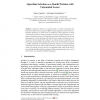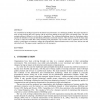83 search results - page 1 / 17 » Psychological models of human and optimal performance in ban... |
116
click to vote
COGSR
2011
14 years 8 months ago
2011
In bandit problems, a decision-maker must choose between a set of alternatives, each of which has a fixed but unknown rate of reward, to maximize their total number of rewards ov...
109
click to vote
ECML
2005
Springer
15 years 7 months ago
2005
Springer
The multi-armed bandit problem for a gambler is to decide which arm of a K-slot machine to pull to maximize his total reward in a series of trials. Many real-world learning and opt...
134
click to vote
LION
2010
Springer
15 years 5 months ago
2010
Springer
Abstract. Algorithm selection is typically based on models of algorithm performance learned during a separate offline training sequence, which can be prohibitively expensive. In r...
124
Voted
NIPS
2008
15 years 3 months ago
2008
We use graphical models and structure learning to explore how people learn policies in sequential decision making tasks. Studies of sequential decision-making in humans frequently...
IADIS
2003
15 years 3 months ago
2003
The contribution of intelligent agents for the human team performance is a challenging problem. This paper introduces a study to help clarifying this issue, starting with the moti...


